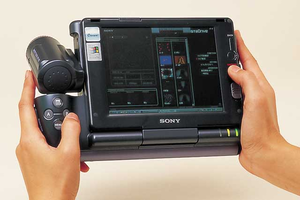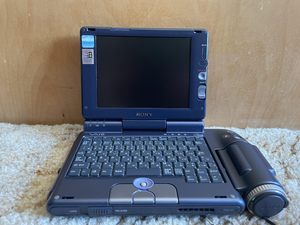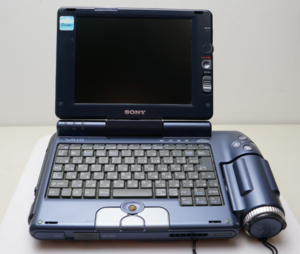PCG-GT: Difference between revisions
Resident007 (talk | contribs) (initial commit) |
Resident007 (talk | contribs) No edit summary |
||
| (25 intermediate revisions by 2 users not shown) | |||
| Line 1: | Line 1: | ||
== Overview == | |||
[[File:PCG-GT JP.jpg|thumb|Sony VAIO PCG-GT3 promotional image]]The Sony VAIO PCG-GT was a line of ultraportable subnotebooks with a built-in digital camera sold by Sony exclusively in Japan from November 2000 to late 2001. | |||
The original model, PCG-GT1 released on November 18, 2000. A higher-end model featuring darker colors and larger hard drive, PCG-GT3 (/K) was released on June 30, 2001. | |||
Both models featured a large camera on the side, intended to be primarily used for taking pictures that could later be shared on an image sharing service ImageStation, and for video recording and live streaming to PercasTV service, one of the first live video streaming services. | |||
[[File:PCG-GT1-handheld.png|thumb|PCG-GT1 in camcorder mode]] | |||
Since the PCG-GT is designed like a sort of camcorder, the lid is able to rotate 180°, meaning you can close the lid with the display on the outside. The camera is also able to rotate vertically, allowing for a fairly pleasing experience when taking pictures or videos. The PCG-GT is able to capture pictures up to 640x480 resolution, and videos up to 640x480 (15FPS) or 320x240 (30FPS) in AVI format. | |||
Build quality is good, made out of metal for the lid, and plastic for the rest. The keyboard, being much smaller than full size because of the form factor of the device, is still usable, however don't expect a very pleasing experience. No trackpad is provided, only a trackpoint. | |||
A total of 5000 PCG-GT1 units were made. The number of PCG-GT3 units produced is unknown, but is likely the same as for PCG-GT1. | |||
Some of the design choices featured in PCG-GT line were carried over to the [[PCG-U]] line in 2002. | |||
==Detailed Specs== | |||
There were two models released, PCG-GT1 and PCG-GT3 (/K). Both of them were very similar aside from a few minor differences in appearance, different hard drives, and Windows 2000 instead of ME in PCG-GT3. Both featured a Transmeta Crusoe TM5600 processor built on [[wikipedia:Very_long_instruction_word|VLIW]] architecture, similar to the TM5800 found in PCG-U series, however the one in PCG-GT is earlier and thus slower. | |||
====PCG-GT1==== | |||
[[File:PCG-GT1.png|thumb|Sony VAIO PCG-GT1]] | |||
'''Processor:''' Transmeta Crusoe TM5600 600MHz | |||
'''Graphics:''' ATI RAGE Mobility M1, 8MB VRAM | |||
'''Memory:''' 128MB | |||
'''Display:''' 6.4" 1024×768 | |||
'''Camera:''' 1/4-inch CCD 680,000 pixels (340,000 effective pixels) f=3.3-33mm (42-420mm in 35mm camera equivalent) F1.7-2.2 | |||
'''Storage:''' 20GB 2.5-inch IDE HDD | |||
'''Weight:''' 1.1kg | |||
'''Original OS:''' Microsoft Windows Millenium Edition | |||
'''MSRP:''' ¥285,800 | |||
== | ====PCG-GT3 (/K)==== | ||
[[File:PCG-GT3-K.png|thumb|Sony VAIO PCG-GT3/K]] | |||
'''Processor:''' Transmeta Crusoe TM5600 600MHz | |||
'''Graphics:''' ATI RAGE Mobility M1, 8MB VRAM | |||
'''Memory:''' 128MB | |||
'''Display:''' 6.4" 1024×768 | |||
'''Camera:''' 1/4-inch CCD 680,000 pixels (340,000 effective pixels) f=3.3-33mm (42-420mm in 35mm camera equivalent) F1.7-2.2 | |||
''' | |||
''' | '''Storage:''' 30GB 2.5-inch IDE HDD | ||
''' | '''Weight:''' 1.1kg | ||
''' | '''Original OS:''' Microsoft Windows 2000 Professional | ||
''' | '''MSRP:''' ¥230,000 | ||
==Daily Usage Today== | |||
Much like back then, the PCG-GT is slow, and is only good enough for light tasks of its era. Camera is not acceptable by modern standards, but was fairly good back then. There is little to no usability in modern tasks for any PCG-GT model. | |||
' | The PCG-GT is a very rare collector's item, and is rarely found for sale anywhere. | ||
==Resources== | |||
== | ===== Recovery Discs ===== | ||
{| class="wikitable" | |||
|PCG-GT1 | |||
|[https://archive.org/details/sony-vaio-pcg-gt1-system-recovery-discs Internet Archive] | |||
|} | |||
===== Hard drive images ===== | |||
{| class="wikitable" | |||
|PCG-GT1 | |||
|[https://archive.org/details/PCG-GT1-disk Internet Archive] | |||
|} | |||
== | ===== Manuals and Useful Links ===== | ||
{| class="wikitable" | |||
|PCG-GT1 | |||
|[https://archive.org/details/vaio-pcg-gt-1-manual Internet Archive] | |||
|- | |||
|PCG-GT1 (English translated) | |||
|[https://archive.org/details/pcg-gt1-english-manual Internet Archive] | |||
|} | |||
===== Disassembly Guide ===== | |||
[https://www.youtube.com/watch?v=DleoLLrvpdc Sony VAIO PCG-GT1 Disassembly Guide] | |||
== Credits == | ==Credits== | ||
[https://sony.com Sony], [https://pc.watch.impress.co.jp/ pc.watch.impress.co.jp] | |||
Latest revision as of 09:53, 22 December 2024
Overview
The Sony VAIO PCG-GT was a line of ultraportable subnotebooks with a built-in digital camera sold by Sony exclusively in Japan from November 2000 to late 2001.
The original model, PCG-GT1 released on November 18, 2000. A higher-end model featuring darker colors and larger hard drive, PCG-GT3 (/K) was released on June 30, 2001.
Both models featured a large camera on the side, intended to be primarily used for taking pictures that could later be shared on an image sharing service ImageStation, and for video recording and live streaming to PercasTV service, one of the first live video streaming services.
Since the PCG-GT is designed like a sort of camcorder, the lid is able to rotate 180°, meaning you can close the lid with the display on the outside. The camera is also able to rotate vertically, allowing for a fairly pleasing experience when taking pictures or videos. The PCG-GT is able to capture pictures up to 640x480 resolution, and videos up to 640x480 (15FPS) or 320x240 (30FPS) in AVI format.
Build quality is good, made out of metal for the lid, and plastic for the rest. The keyboard, being much smaller than full size because of the form factor of the device, is still usable, however don't expect a very pleasing experience. No trackpad is provided, only a trackpoint.
A total of 5000 PCG-GT1 units were made. The number of PCG-GT3 units produced is unknown, but is likely the same as for PCG-GT1.
Some of the design choices featured in PCG-GT line were carried over to the PCG-U line in 2002.
Detailed Specs
There were two models released, PCG-GT1 and PCG-GT3 (/K). Both of them were very similar aside from a few minor differences in appearance, different hard drives, and Windows 2000 instead of ME in PCG-GT3. Both featured a Transmeta Crusoe TM5600 processor built on VLIW architecture, similar to the TM5800 found in PCG-U series, however the one in PCG-GT is earlier and thus slower.
PCG-GT1
Processor: Transmeta Crusoe TM5600 600MHz
Graphics: ATI RAGE Mobility M1, 8MB VRAM
Memory: 128MB
Display: 6.4" 1024×768
Camera: 1/4-inch CCD 680,000 pixels (340,000 effective pixels) f=3.3-33mm (42-420mm in 35mm camera equivalent) F1.7-2.2
Storage: 20GB 2.5-inch IDE HDD
Weight: 1.1kg
Original OS: Microsoft Windows Millenium Edition
MSRP: ¥285,800
PCG-GT3 (/K)
Processor: Transmeta Crusoe TM5600 600MHz
Graphics: ATI RAGE Mobility M1, 8MB VRAM
Memory: 128MB
Display: 6.4" 1024×768
Camera: 1/4-inch CCD 680,000 pixels (340,000 effective pixels) f=3.3-33mm (42-420mm in 35mm camera equivalent) F1.7-2.2
Storage: 30GB 2.5-inch IDE HDD
Weight: 1.1kg
Original OS: Microsoft Windows 2000 Professional
MSRP: ¥230,000
Daily Usage Today
Much like back then, the PCG-GT is slow, and is only good enough for light tasks of its era. Camera is not acceptable by modern standards, but was fairly good back then. There is little to no usability in modern tasks for any PCG-GT model.
The PCG-GT is a very rare collector's item, and is rarely found for sale anywhere.
Resources
Recovery Discs
| PCG-GT1 | Internet Archive |
Hard drive images
| PCG-GT1 | Internet Archive |
Manuals and Useful Links
| PCG-GT1 | Internet Archive |
| PCG-GT1 (English translated) | Internet Archive |



